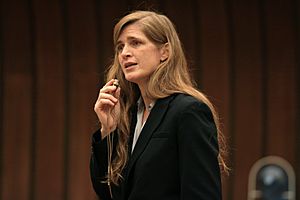FreeThe20 campaign facts for kids
FreeThe20 was a special campaign that aimed to help women around the world who were held in prison unfairly. These women were called political prisoners because they were often jailed for speaking up or for their beliefs, not for breaking regular laws. The campaign highlighted twenty women who were unjustly imprisoned.
The campaign was started by Samantha Power, who was the U.S. Ambassador to the United Nations. She launched it to mark the twentieth anniversary of an important meeting called the Beijing Declaration. This meeting was about women's rights.
The main goal of FreeThe20 was to tell governments to stop putting women in prison without good reason. It also wanted to show the imprisoned women and their families that people cared about them and they were not forgotten. The campaign introduced one woman's name each day for twenty days, representing each year since the Beijing Declaration.
How the U.S. Senate Supported FreeThe20
In September 2015, a special proposal, called a bill, was brought to the U.S. Senate. This bill was about the FreeThe20 campaign. It was supported by all twenty women senators from both major political parties in the U.S. When both parties agree on something, it's called "bipartisan."
These senators made a strong statement together. They said that as women serving in the Senate, they stood united. They called on governments everywhere to respect the basic human rights of women. They also asked for the release of women who had been put in prison unfairly for using their rights, like speaking freely.
Who Were the FreeThe20 Women?
The FreeThe20 campaign shone a light on many brave women from different countries. Many of these women were later released from prison. Here are some of the women highlighted by the campaign:
- Rasha Sharbaji from Syria (she was later freed)
- Tạ Phong Tần from Vietnam (she was later freed)
- Women Political Prisoners from North Korea
- Nadiya Savchenko from Ukraine/Russia (she was later freed)
- Naw Ohn Hla from Burma (she was later freed)
- Sanaa Seif from Egypt (she was later freed)
- Judge María Lourdes Afiuni Mora from Venezuela (she was later freed)
- Bui Thi Minh Hang from Vietnam (she was later freed)
- Liu Xia from China (she was later freed)
- Phyoe Phyoe Aung from Burma (she was later freed)
- Leyla Yunus from Azerbaijan (she was later freed)
- Matlyuba Kamilova from Uzbekistan
- Aster Yohannes from Eritrea
- Gao Yu from China (she was later freed)
- Blen Mesfin, Meron Alemayehu, and Nigist Wondifraw from Ethiopia (they were later freed)
- Bahareh Hedayat from Iran
- Khadija Ismayilova from Azerbaijan (she was later freed)
- Wang Yu from China (she was later freed)


